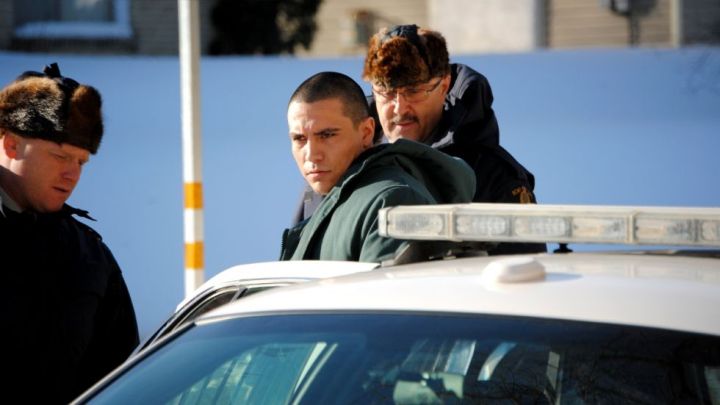Mason Montgrand was 21 years old when he was killed at an Edmonton maximum security prison in 2011.

A trial for the fellow inmate charged in his death, Lance Regan, was to begin this fall.
But Alberta Court of Queen’s Bench Justice Stephen Hillier tossed the charge against Regan in October, deciding his constitutional right to be tried in a reasonable time had been violated. The Crown is appealing.
READ MORE: Crown appeals judge’s decision to throw out first-degree murder case over trial delays
Helen Montgrand can’t get her son’s final moments out of her mind.
“I’m going crazy thinking about my boy, how many times he got stabbed,” Helen Montgrand said through sobs from her home in La Loche, Sask.
“I’m going crazy thinking about him all the time and it’s not fair to let that person go.”
The stay of Regan’s first-degree murder charge was one of the more high-profile decisions to come down after a Supreme Court of Canada ruling this summer established what constitutes an unreasonable trial delay.
The top court, in deciding to set aside the drug convictions of Barrett Richard Jordan, set time limits of 18 months in provincial court and 30 months in a superior court from a charge to a trial’s end.
READ MORE: Supreme court creates new timely-trial framework
However, the new framework set out in the Jordan case factors in exceptional circumstances and provides some flexibility for dealing with cases that were already in the system through so-called transitional exceptions.
“Jordan has not led to dramatically more stays,” said Steve Coughlan with Dalhousie University’s Schulich School of Law. “However, it has led to dramatically more concern about preventing delay in the criminal justice system.
“That is a good thing from everyone’s point of view.”
In the Regan case, Hillier calculated the total delay at 62.5 months, but subtracted 24 months he attributed to the defence. He determined the remaining 38.5 months could not be justified.
Another high-profile Alberta case went the other way.
Last Thursday, Queen’s Bench Justice Glen Poelman dismissed a stay application for three men convicted in the 2013 swarming death of Lukas Strasser-Hird, saying the Crown reasonably relied on the old rules that factored in the seriousness of the crime and institutional delays.
Poelman determined the trial exceeded the Jordan ceiling, but by less than a month.
READ MORE: Jordan application denied for Lukas Strasser-Hird’s killers
Franz Cabrera, Joch Pouk and Assmar Shlah are to be sentenced in the new year. Appeals are in the works.
Alberta Justice says there have been 36 Jordan applications since the summer and so far seven have been dismissed and five have been granted.
Coughlan said he knows of roughly 100 rulings on applications citing the Jordan decision across Canada since the summer. Of the 40 or so he’s examined, there has been about a 50-50 split between those dismissed and those granted.
University of Calgary law professor Lisa Silver said she’s not expecting the same impact from Jordan as another key delay-related Supreme Court case from 1990.
Silver was practising as a defence lawyer in Toronto when the top court ruled on unreasonable delays involving an extortion case called Askov. Tens of thousands of cases were abruptly withdrawn by the Crown.
“It was astonishing,” she said.
Two years later, a case called Morin, which involved delays in an impaired driving conviction, led to a framework that took into account a number of factors, such as the seriousness of the crime and the impact on the accused.
READ MORE: Alberta murder case thrown out over trial delays; experts warn system on verge of collapse
In its Jordan decision, the Supreme Court decried the “culture of complacency” that had developed since Morin.
“There really wasn’t a very strong incentive for Crown prosecutors or judges to move cases along quickly because the old system allowed a lot of delay to be explained away,” said Coughlan.
Silver said before Jordan, the onus was on the defence to show how delays prejudiced their client. But now, prejudice is presumed if timelines are exceeded and it’s up to the Crown to rebut it.
“The public has an interest in an effective and efficient judicial system that’s timely, but fair,” said Silver.
“It has to be smart prosecutions and smart trials.”


Comments